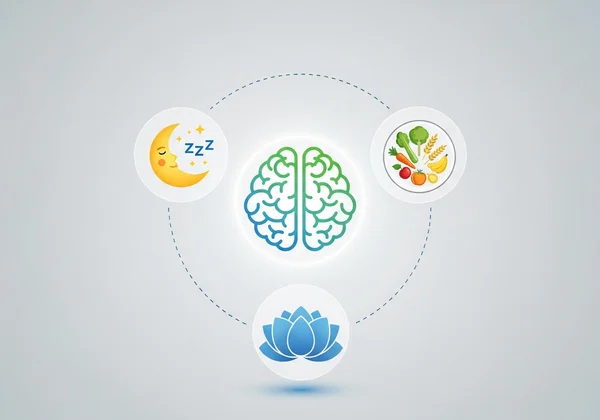How to Prepare for Your WAIS Test Day: Practical Tips
November 20, 2025 | By Theodore Finch
Facing a Wechsler Adult Intelligence Scale (WAIS) test can bring a mix of anticipation and nerves. It's a comprehensive assessment of cognitive abilities, and it's natural to want to perform your best. Many people wonder how to prepare for a wais test, hoping to find a study guide or a set of practice questions. But what can you really do to prepare?
While you can't "study" for an intelligence test in the traditional sense, you absolutely can prepare yourself to perform at your peak. This guide offers practical, actionable tips to ensure you approach your assessment day with a calm, clear, and focused mind. By optimizing your physical and mental state, you create the ideal conditions to showcase your true abilities. For more WAIS test insights, explore our resources.
Effective WAIS Test Preparation: Beyond Studying
The first step in preparing for the WAIS is to shift your mindset away from conventional studying. This isn't a test of memorized facts but an evaluation of your cognitive processes, like reasoning, problem-solving, and memory. Understanding this distinction is key to effective preparation.

The Myth of "Studying" for the WAIS Test
The WAIS is meticulously designed by experts to be a standardized measure of intelligence, meaning it's protected from the effects of short-term cramming. The tasks are novel and measure underlying cognitive skills, not academic knowledge. Trying to "study" specific answers is not only impossible but counterproductive, as it can increase anxiety and create a false sense of preparedness. The goal is not to learn answers but to allow your natural problem-solving skills to shine through.
Why Non-Cognitive Factors Matter for Your Performance
Your performance on any given day is influenced by a range of factors beyond pure intellect. These are the areas where you have control and where your preparation efforts should be focused. Research consistently shows that sleep deprivation, poor nutrition, stress, and anxiety can significantly impair cognitive functions like attention, working memory, and executive function—all of which are measured by the WAIS. These test performance factors are critical, as a tired or stressed brain simply doesn't operate at its full capacity. Therefore, preparing your body and mind is the most effective strategy.

Practical Tips for a Calm and Focused WAIS Assessment Day
Now, let's dive into the actionable steps you can take in the days leading up to your wais assessment day. These strategies are designed to put you in the best possible position to succeed by ensuring your mind is sharp and your nerves are settled.
Prioritizing Rest: The Power of Sleep and Relaxation
Your brain consolidates information and recharges its cognitive resources during sleep. Aim for 7-9 hours of quality sleep for several nights leading up to your test. Avoid pulling an all-nighter or altering your sleep schedule drastically. On the evening before, engage in calming activities. Read a book, listen to soothing music, or take a warm bath. Steer clear of screens and stressful conversations. Proper sleep and relaxation are non-negotiable for optimal brain function.

Fueling Your Brain: Nutrition and Hydration Strategies
What you eat and drink has a direct impact on your focus and energy levels. On the morning of the test, eat a balanced breakfast containing complex carbohydrates, protein, and healthy fats. Oatmeal with berries and nuts or eggs with whole-wheat toast are excellent choices. Avoid sugary cereals or pastries that can lead to an energy crash. Stay hydrated by drinking water, but don't overdo it right before the test begins. Proper nutrition and hydration will help maintain stable energy levels throughout the assessment.
Managing Pre-Test Anxiety and Stress
It's completely normal to feel a bit anxious. The key is to manage that feeling so it doesn't interfere with your performance. Practice simple mindfulness or deep-breathing exercises in the days before and on the morning of the test. Inhale slowly for four counts, hold for four, and exhale for six. This technique can calm your nervous system instantly. Remind yourself that the WAIS is a tool for understanding, not a judgment of your worth. Effective anxiety management can make a significant difference.
Logistics and What to Bring on Test Day
Eliminate last-minute stress by planning your logistics. Know exactly where you need to go and how you'll get there, accounting for potential traffic. Lay out comfortable clothes the night before. Your test day checklist should be simple:
- Your appointment details and contact information for the administrator.
- Any required identification.
- Your eyeglasses or hearing aids, if you use them.
- A bottle of water and a light snack for breaks (if permitted).
- Avoid bringing anything that isn't necessary, as distractions should be minimized.
What to Expect During Your WAIS Assessment
Knowing what to expect wais test procedures can significantly reduce anxiety. Familiarizing yourself with the general format and environment allows you to focus all your mental energy on the tasks at hand rather than on the unknown.
Understanding the Testing Environment and Administrator's Role
The WAIS is administered one-on-one in a quiet, comfortable room, free from distractions. The test administrator is a trained professional whose role is to present the tasks according to strict standardized procedures and make you feel as comfortable as possible. They are not there to judge you; they are there to facilitate the assessment accurately. Feel free to ask clarifying questions about instructions if you don't understand something, but remember they cannot help you with the answers. The wais testing environment is designed for focus.

Navigating the Different WAIS Subtests
The WAIS is composed of numerous smaller tests called subtests, which are grouped to measure different areas of cognitive ability: Verbal Comprehension, Perceptual Reasoning, Working Memory, and Processing Speed. You'll encounter a variety of tasks, from defining words and solving puzzles to remembering sequences of numbers and identifying patterns. The wais test structure is varied to keep you engaged. Just focus on one task at a time, do your best, and then move on to the next one without dwelling on your previous performance.
Final Thoughts on Your WAIS Test Day
Approaching your WAIS test prepared, rested, and calm is the most powerful strategy for showcasing your true cognitive abilities. Remember, this assessment is a snapshot of your skills on a particular day, not a final verdict on your entire worth or potential. It's a tool for gaining valuable self-knowledge.
Once you receive your official scores, the journey of understanding truly begins. The report can seem complex, but that's where we can help. At our expert WAIS score interpretation service, we specialize in breaking down what it all means. For those seeking to go even deeper, our unique AI-driven analysis service can transform your score profile into a personalized report, highlighting your cognitive strengths and offering actionable insights for personal and professional growth. Visit our platform to explore your results.
Frequently Asked Questions About WAIS Test Preparation
What does the WAIS test measure?
The WAIS test is a comprehensive cognitive assessment that measures intellectual ability across four key domains: Verbal Comprehension (verbal reasoning and knowledge), Perceptual Reasoning (visual-spatial and fluid reasoning), Working Memory (attention and mental manipulation of information), and Processing Speed (speed and accuracy of visual scanning and processing). It provides a Full Scale IQ (FSIQ) score as well as scores for each of these indexes.
How long does WAIS testing typically take?
A complete WAIS administration typically takes between 60 and 90 minutes, though it can sometimes extend longer depending on the individual. The test is composed of several subtests, and the administrator will guide you through the entire process, providing instructions for each section.
Is the WAIS test reliable and valid?
Yes, the WAIS is considered the gold standard in adult intelligence testing due to its high levels of reliability and validity. It has been developed and refined over decades through rigorous research and is standardized on large, representative samples of the population. This ensures that the scores are consistent and accurately measure the cognitive abilities they are designed to assess.
Can I take the WAIS test online?
No, a legitimate WAIS test cannot be taken online. To maintain standardization and validity, it must be administered in person by a trained and qualified professional. Websites claiming to offer an "online WAIS test" are not providing the official assessment. At Wais Test, we provide comprehensive information about the test and offer a unique AI analysis of your official results, but we do not administer the test itself. Learn more at our expert guide.
What is a good score on the WAIS test?
WAIS scores are standardized so that the average score for the general population is 100, with a standard deviation of 15. This means that approximately 68% of people score between 85 and 115. A "good" score is subjective and depends entirely on the individual context. The most valuable information often comes not from the overall score but from understanding the patterns and variations within your unique cognitive profile, which can reveal personal strengths and areas for development.